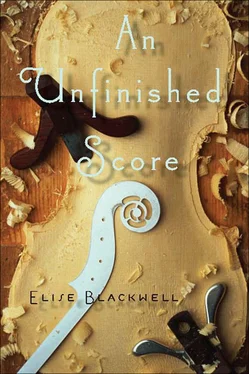“By ‘American’ I mean that sex is too important to you, so you have less of it. It just doesn’t mean as much to me, for instance. It’s not a big deal, just two bodies for a little while. No big deal.”
“If it’s not a big deal, then why do people bother to promise fidelity? Isn’t it a big deal for a man to know his children are actually his children? If it’s not a big deal, then why do so many couples break up over it?” Jennifer’s face glows with her certainty.
“Because they’re American!” Petra’s words are loud enough to attract attention from nearby conversations.
As if sensing trouble, the pianist launches into a suddenly louder piece: a Liszt transcription from Gounod. Suzanne remembers reading once, in a biography of Liszt, that at each performance he would toss his glove to his choice for that night’s pleasure, a different recipient every night.
“You and Liszt have similar appetites,” Suzanne says, losing patience with having to secure Petra when she drinks too much.
Petra strides away.
Suzanne shrugs at Jennifer. “Sorry about her. I think maybe she’s had a little too much champagne.”
“Nothing new, I suppose, but so vehement. If I didn’t know better, I’d think she was seducing Anthony.” Jennifer laughs now, fingering the beads of her pearl strands, adding, “It’s not that I don’t trust him, necessarily — he is a man — just that I keep his leash very short. I read that the number-one predictor of infidelity is opportunity.”
Suzanne looks anew at Jennifer, seeing in her broad face a woman more self-aware than she’d noticed before. Jennifer is one more person, Suzanne thinks, whom she has misjudged or at least misunderstood.
“I’d better find Petra and get her out of here before she talks to a potential donor.”
Jennifer’s hair swings at her shoulders as she nods. She touches Suzanne’s shoulder. “Thank you for coming, and thank you for getting her out of here before she does any damage.”
Getting Petra into the car is easier than Suzanne expected. Petra has gone docile with a turn in mood, though now she is crying and her tears are fierce.
“Honey,” Suzanne whispers, “if it’s not such a big deal, why are you so upset?”
“She’s a stupid woman. Stupid and fat,” Petra exclaims before going submissive again. “I’m sorry. I just drank too much on an empty stomach. The performance and all. We were really good, weren’t we?”
“Yeah.” Suzanne grins. “We were really good. Really, really good.”
“We rocked!” Petra high-fives her. “We were awesome!” The American slang or the champagne exaggerates her ordinarily slight accent.
After Suzanne maneuvers the car through the narrow driveway and into its space, moving the gear to park , Petra slides herself out of the car and totters toward the back door. She points to her shoes. “I’m not actually drunk. I’m just tall.”
“You are definitely too far from the ground.” Suzanne slams shut both car doors and then follows her friend inside, where she assumes not only Adele but Ben is deep in sleep.
The quartet’s performance now part of her past, Suzanne returns to work on the concerto. She works the way she used to, the way she worked when she still believed the world was hers for the taking if she just tried hard enough.
But still it is not enough. Working with Alex’s score, her hands and mind in his measures of music, was supposed to keep him close to her, in her. But the harder she seeks him, the more remote he becomes. She cannot find herself in his work, not even herself as violist. Maybe he knew you as little as you knew him . As she works, grief reverberates in her ears, an inaudible sound felt rather than heard. Grief not that she has lost him but that she is losing him always, over and over. It is the sensation of abandonment, of being left alone and not knowing in what form you will survive it.
She tries every theoretical approach she learned at Curtis and through her own studies, and she tries the more personal, remembering Alex’s reactions to other concertos. Once, in Seattle, they heard Vassily Primakov play Chopin’s first piano concerto. Flawed and brilliant, the work has been criticized since its premiere for its elementary orchestration. “But the piano itself!” Alex said, eyes lit with excitement.
But that does not apply to his viola concerto — the solo line is not enough.
The best concertos are relational; their very subject matter is the relationship between the soloist and the rest of the orchestra. She doesn’t want to write a second-rate piece of music, and she doesn’t want Alex to have conceived of one. There has to be a key, she thinks, to open the door between the brilliant and difficult viola score and the rest of the instruments.
Again and again she wants to throw down the work. Yet she continues, clinging to the belief that she will restore Alex to herself, that if she follows him around enough corners, she will reach the end of the maze and find something of him to grab. Then she will understand — the music, the person Alex was, the person she was with him, what she is without him.
She also knows, when she lets herself think about it, that she works because she fears Olivia. Suzanne does not want her life undone. She does not want Ben hurt more, and she does not want to lose him. Her life may not be the life she wanted, but it could be much worse.
Or perhaps it is the challenge that keeps her working: the old ambition, the deep desire to compose and now, at last, a chance to start that part of her life, to be alone and see in what form she will survive it. So she comes back to the work every morning and most nights.
It is midmorning on a very hot Tuesday when she breaks through. It is the most mundane of moments. She is sitting in her living room, cross-legged in shorts and a tank top, her hairline and back damp with sweat because they cannot afford to run the air conditioner all the time. She is eating grapes, slowly because they have seeds.
Understanding doesn’t come in a single flash, but it does develop quickly, building like a strong wave. She stares at the score and in her mind hears what is missing from the concerto: an elegiac echo against the viola line. Alex left space for it but left it unwritten, almost as though he foresaw his own death. Holding the dead and the missing in her mind — her mother, Charlie, her baby, Robert Schumann, the Adele born with hearing ears, but mostly Alex — she writes for the orchestra an elegiac line, a subdued but emotion-saturated voice to accompany and answer the viola. Less than an equal conversation but a clear voice that she allows to snake among the double reeds and the cello. Mostly it will be carried by the bassoon, that comic tragedy of a tone, an instrument like a man with the face of a clown and a heart aching with unrequited love.
There is more than one solution to every musical conundrum, yet Suzanne believes she has found Alex’s true intention, or something very close. It solves for her the mystery of a concerto written by a man who found most concertos distasteful. The viola does not perform a virtuosic solo, though virtuosity is required, but is the stronger half of a duet before the crowd of the orchestra. The central voice is witnessed, and it is answered. She spits out a grape seed and nods.
After Suzanne completes her work on the concerto and sends it off to Olivia, she returns to full-time practice. When playing alone, she finds a new lightness and pleasure in her instrument, its look and feel, smell and sound. She plays whatever she feels like, including some frothier baroque tunes, some Roma dance music, Debussy, moving from one thing to the next according to mood or whim.
Читать дальше












